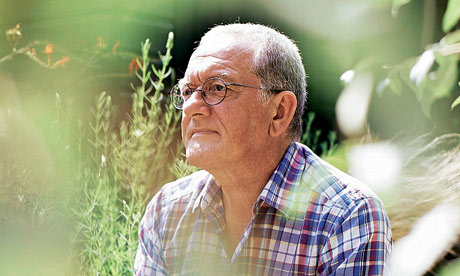
That morning, I got the train as always. I was a publishing director and was looking forward to reading my newspaper, as usual. I would always turn to the cryptic crossword, but that day it didn't make any sense. I'd been doing it for 30-odd years, but trying to read this one was like treading through treacle: incredibly slow and hard. I thought I must be tired.
At the office, I sat down, turned on my computer and found I couldn't read the message on the screen. I said to my assistant, "This is strange, I can't make my computer work", and she started laughing. Although I had no idea at the time, I was speaking gibberish.
Eventually, worried colleagues contacted my wife, Beth, and she drove me straight to hospital. There, confirmation came that I'd had a stroke in the part of my brain that deals with communication. I was now suffering from aphasia, a condition that means it's difficult or impossibe to receive and produce language. When Beth asked the consultant how long it would take for me to get better, he replied, "How long is a piece of string?"
Over that first day, I got progressively worse. I couldn't understand what people were saying; I couldn't speak intelligibly; I couldn't read or write. A couple of nights later, I had to go to the loo and realised I couldn't read the signs on the doors. That was the first time I thought, "Christ, this is serious." It was the only time I cried.
I was back at home a week later, and my goal was to get better and return to work in a couple of months. I started seeing a speech therapist three times a week, and was given homework to help rebuild my vocabulary and grammer. I'd look at simple pictures and try to describe them as my mind wandered round and round in the darkness, looking for words.
Apart from being incredibly tired, and sleeping for hours and hours, I felt healthy. But I was deeply confused. Sitting around the table with my wife and children, all I could hear was a babble of noise. I couldn't separate sounds, be it a dog barking outside, music in the background or my wife talking to me. It was hugely frustrating. After a month, my own speech became functional – "Could you pass the salt?" "Shall we go for a walk?" – but I couldn't have a conversation. I couldn't read the newspaper. When I sat down to my favourite television programme, The Sopranos, I couldn't understand a thing. I felt isolated.
People at work were fantastically supportive, but as the months passed it became clear I wasn't going to be able to go back to my old job. I still couldn't read properly, or have a phone conversation. The phrase that kept going through my mind was: damaged goods. For 25 years, I had defined myself as a publisher. I was used to a busy day of meetings, and bringing three manuscripts home with me each night. I enjoyed colleagues, I enjoyed working with writers and the status I'd had. I loved reading books and the sustenance of new ideas. I didn't feel ready to say goodbye to my old self. There were times when I felt incredibly angry.
In the darkest months, I devoted myself to trying. I would spend hours writing a description of something simple like a pencil, which would run over two pages. I couldn't manage novels or newspapers, so I tried reading poetry, and found the shorter lines less overwhelming. My speech came back, and I learned how to read again, albeit much more slowly. I also learned patience, and the ability to zone out of conversations when I couldn't keep up. I spent more time outside, looking after our garden, and eventually got a job a couple of days a week at a nursery. I allowed myself to slow down, and started to enjoy it.
Gradually, I sloughed off my old skin. I grieved the past, its passing and its absence, and started to come to terms with it. Now, 10 years later, I look after my grandson a day a week, and my relationship with my family is deeper than ever. We have learned to be very patient with each other. If you'd asked me 15 years ago to rank the importance of the things in my life I might have said family, but in truth my all-consuming job was up there as well. I'm no longer a high-achieving publisher or someone who reads 10 books a week. I'm a family man and gardener with aphasia, and if I read 10 books a year, that's pretty good.
• For more information on aphasia, visit Connect at ukconnect.org.
As told to Becky Barnicoat
Do you have an experience to share? Email experience@theguardian.com

